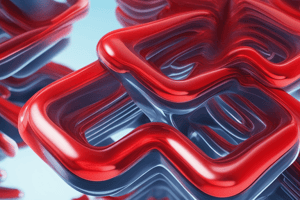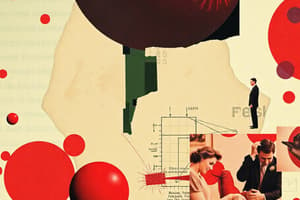Podcast
Questions and Answers
What is the main function of White Blood Cells (Leukocytes) in the body?
What is the main function of White Blood Cells (Leukocytes) in the body?
- Playing a vital role in the immune system (correct)
- Responsible for blood clotting and wound healing
- Removing carbon dioxide from the tissues
- Carrying oxygen from the lungs to tissues
Who observed living cells within Spirogyra algae, contributing to our understanding of blood components?
Who observed living cells within Spirogyra algae, contributing to our understanding of blood components?
- Basophils
- Monocytes
- Robert Hooke
- Antonie van Leeuwenhoek (correct)
Which type of cell is responsible for carrying oxygen from the lungs to tissues and removing carbon dioxide back to the lungs for exhalation?
Which type of cell is responsible for carrying oxygen from the lungs to tissues and removing carbon dioxide back to the lungs for exhalation?
- White Blood Cells (Leukocytes)
- Neutrophils
- Red Blood Cells (Erythrocytes) (correct)
- Platelets (Thrombocytes)
What is the role of Platelets (Thrombocytes) in blood physiology?
What is the role of Platelets (Thrombocytes) in blood physiology?
What is the significance of the Cell Theory in relation to blood science?
What is the significance of the Cell Theory in relation to blood science?
How has the discovery of DNA impacted blood science?
How has the discovery of DNA impacted blood science?
What is the primary purpose of artificial blood substitutes?
What is the primary purpose of artificial blood substitutes?
How has gene editing technology like CRISPR impacted the field of blood science?
How has gene editing technology like CRISPR impacted the field of blood science?
What biological effect does chronic stress have on individuals according to recent research?
What biological effect does chronic stress have on individuals according to recent research?
How is socioeconomic status (SES) linked to health outcomes based on recent studies?
How is socioeconomic status (SES) linked to health outcomes based on recent studies?
Who was the founder of the Bikaner Rajwansh?
Who was the founder of the Bikaner Rajwansh?
Which ruler of Bikaner played a crucial role in the Battle of Haldighati?
Which ruler of Bikaner played a crucial role in the Battle of Haldighati?
In what year did Bikaner officially gain its independence?
In what year did Bikaner officially gain its independence?
Which ruler of Bikaner further expanded its territories and strengthened its relationship with the Mughal Empire?
Which ruler of Bikaner further expanded its territories and strengthened its relationship with the Mughal Empire?
What was one of the key cultural contributions of the Bikaner Rajwansh?
What was one of the key cultural contributions of the Bikaner Rajwansh?
Which ruler from the Bikaner Rajwansh was known for overseeing the construction of the Lalgarh Palace?
Which ruler from the Bikaner Rajwansh was known for overseeing the construction of the Lalgarh Palace?
In what architectural style is the Junagarh Fort built, reflecting a blend of influences?
In what architectural style is the Junagarh Fort built, reflecting a blend of influences?
Which ruler of Bikaner was particularly known for their military prowess?
Which ruler of Bikaner was particularly known for their military prowess?
What notable role did the Bikaner Camel Corps play during historical conflicts?
What notable role did the Bikaner Camel Corps play during historical conflicts?
Which structure from Bikaner showcases the taste and architectural style of Maharaja Ganga Singh?
Which structure from Bikaner showcases the taste and architectural style of Maharaja Ganga Singh?
Study Notes
Unravelling the Complexity of Blood: A Journey through Biology
Blood, the life-sustaining fluid that courses through our veins, is a marvel of biology. It embodies the intricate dance of countless cells, proteins, and molecules that make us human. In this exploration, we'll delve into the fascinating world of blood, highlighting its history, composition, and the scientific discoveries that have shaped our understanding of this vital fluid.
The Origins of Blood
Blood's story began with the discovery of cells in the 17th century by Robert Hooke. Its components were further elucidated by the pioneering work of Antonie van Leeuwenhoek, who observed living cells within Spirogyra algae. Over the centuries, scientists have built upon these foundations, revealing the intricate workings of the circulatory system and the components that make up blood.
Blood's Building Blocks
Blood is composed of several types of cells and proteins that work in harmony, each playing a crucial role in maintaining our health.
- Red Blood Cells (Erythrocytes): These small, biconcave cells carry oxygen from the lungs to tissues and remove carbon dioxide back to the lungs for exhalation.
- White Blood Cells (Leukocytes): These cells, which include neutrophils, eosinophils, basophils, monocytes, and lymphocytes, play a vital role in the immune system, defending the body against pathogens.
- Platelets (Thrombocytes): These cell fragments are responsible for blood clotting and wound healing.
- Plasma: A liquid, composed of various proteins and nutrients, that allows blood cells to function properly.
Discoveries that Transformed Blood Science
- The Cell Theory: This fundamental concept, developed in the 19th century, established that living organisms are composed of cells, which are the basic units of structure and function. This theory has been instrumental in understanding the structure and function of blood cells.
- The Discovery of DNA: Understanding the genetic code has allowed scientists to explore the molecular basis of blood disorders and has led to the development of genetic tests to diagnose and treat blood diseases.
- The Century of Immunology: A century marked by the scientific discoveries that led to our understanding of the immune system, including the roles of white blood cells, antibodies, and cell signaling pathways in blood.
Applications in Modern Biology
Understanding blood composition and function has led to numerous applications across the fields of medicine, biology, and biotechnology:
- Blood Transfusions: A lifesaving procedure that has been used for over a century to replace lost blood and save lives.
- Blood Banking: The storage of donated blood, which is essential for emergency surgeries and medical procedures.
- Blood Testing: A non-invasive method used to assess an individual's overall health and diagnose blood disorders and diseases.
- Blood Substitutes: Artificial blood substitutes are being developed to provide oxygen transport capability and reduce blood loss in emergency situations.
- Gene Editing: The use of genetic engineering tools like CRISPR to treat blood disorders and diseases.
Navigating Biological Inequality and Stress
In recent years, researchers have explored the link between socioeconomic status (SES) and health, revealing that chronic stress can lead to biological harm through the allostatic load, which affects chronic inflammation, chromosomal aging, and brain function.
Looking Ahead
As our understanding of blood continues to expand, we can expect future discoveries that will enhance our ability to diagnose, treat, and prevent blood disorders and diseases. Technological advancements, such as CRISPR gene editing, will likely play a significant role in shaping this future.
In conclusion, blood is a complex and fascinating component of our bodies. As we continue to explore the intricacies of this vital fluid, we will uncover new insights that will further our understanding of biology and shape the future of medicine.
Studying That Suits You
Use AI to generate personalized quizzes and flashcards to suit your learning preferences.
Description
Explore the complexity of blood, from its origins to modern applications in medicine and biology. Learn about the composition of blood components, significant scientific discoveries, and future implications in the field of blood science.




